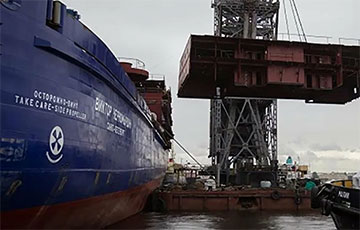Russian Shipbuilding Gives A Distress Signal – Belarusian News
Russia Turns to China for Grain Carrier Construction

In a significant shift, Russia’s largest grain exporters have opted to source new bulk carriers from China, abandoning domestic shipbuilding due to exorbitant costs. The decision comes as the country faces a pressing need to replace its aging fleet of grain transport vessels. With construction costs in Russia estimated to be four times higher than in China, the first ten ships will be built at Chinese shipyards, marking a pivotal moment for Russia’s grain export industry.
Cost Disparities Drive Decision
Russia’s three major grain exporters require over 60 bulk carriers to modernize their fleets, including 27 Handysize and 34 Supramax vessels. The cost of constructing these ships in Russia is prohibitively high, with estimates indicating that the first Handysize vessel would cost approximately 13.9 billion rubles, while subsequent units would still be around 12.5 billion rubles. In contrast, similar vessels can be built in China for just 3.5 billion rubles for Handysize and 4.2 billion rubles for Supramax.
Exporters have indicated that the financial viability of transporting grain hinges on keeping vessel costs below 5.5 billion rubles, with leasing rates ideally capped at 4-5%. The stark difference in construction costs has prompted Rosagroleasing and the United Shipbuilding Corporation (USC) to collaborate with Chinese shipyards for the initial orders. The construction timeline also favors China, where the first vessels could be completed within 18 months, compared to a minimum of two and a half years in Russia, contingent on significant modernization efforts at local shipyards.
Russia’s Vast Naval Modernization Set Back By War In Ukraine
Future Shipbuilding Plans and Local Involvement
Under the agreement between Rosagroleasing and USC, the first batch of ten bulk carriers will be fully constructed in China. However, there is a provision for future vessels, with plans to potentially localize some production. The second batch of 51 bulk carriers may be built in Russia, utilizing equipment supplied by foreign shipyards through Russian intermediaries, provided that the construction costs remain competitive.
USC will oversee the construction process at the Chinese shipyards, ensuring compliance with design specifications and quality standards. This strategic partnership not only addresses the immediate need for new vessels but also opens avenues for future collaboration in shipbuilding, potentially revitalizing Russia’s maritime capabilities in the long term. As the grain export sector adapts to these changes, the focus will remain on maintaining competitiveness in the global market.
